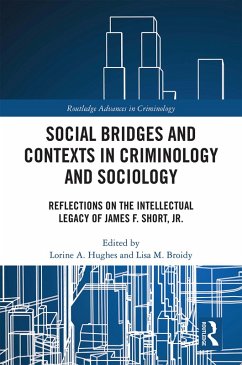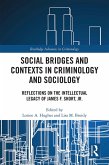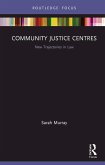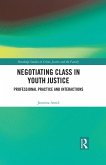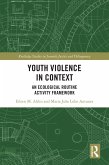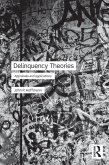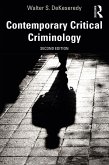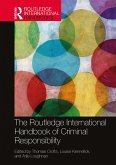Social Bridges and Contexts in Criminology and Sociology (eBook, PDF)
Reflections on the Intellectual Legacy of James F. Short, Jr.
Redaktion: Hughes, Lorine; Broidy, Lisa
41,95 €
41,95 €
inkl. MwSt.
Sofort per Download lieferbar

21 °P sammeln
41,95 €
Als Download kaufen

41,95 €
inkl. MwSt.
Sofort per Download lieferbar

21 °P sammeln
Jetzt verschenken
Alle Infos zum eBook verschenken
41,95 €
inkl. MwSt.
Sofort per Download lieferbar
Alle Infos zum eBook verschenken

21 °P sammeln
Social Bridges and Contexts in Criminology and Sociology (eBook, PDF)
Reflections on the Intellectual Legacy of James F. Short, Jr.
Redaktion: Hughes, Lorine; Broidy, Lisa
- Format: PDF
- Merkliste
- Auf die Merkliste
- Bewerten Bewerten
- Teilen
- Produkt teilen
- Produkterinnerung
- Produkterinnerung

Bitte loggen Sie sich zunächst in Ihr Kundenkonto ein oder registrieren Sie sich bei
bücher.de, um das eBook-Abo tolino select nutzen zu können.
Hier können Sie sich einloggen
Hier können Sie sich einloggen
Sie sind bereits eingeloggt. Klicken Sie auf 2. tolino select Abo, um fortzufahren.

Bitte loggen Sie sich zunächst in Ihr Kundenkonto ein oder registrieren Sie sich bei bücher.de, um das eBook-Abo tolino select nutzen zu können.
This book considers the intellectual legacy of James F. Short, Jr., to criminology and sociology, and covers the full range of his pioneering research on suicide and homicide, criminological theory, self-report methodology, microsocial group processes, and the etiology of gang violence and delinquency.
- Geräte: PC
- ohne Kopierschutz
- eBook Hilfe
- Größe: 4.23MB
Andere Kunden interessierten sich auch für
![Social Bridges and Contexts in Criminology and Sociology (eBook, ePUB) Social Bridges and Contexts in Criminology and Sociology (eBook, ePUB)]() Social Bridges and Contexts in Criminology and Sociology (eBook, ePUB)41,95 €
Social Bridges and Contexts in Criminology and Sociology (eBook, ePUB)41,95 €![Community Justice Centres (eBook, PDF) Community Justice Centres (eBook, PDF)]() Sarah MurrayCommunity Justice Centres (eBook, PDF)20,95 €
Sarah MurrayCommunity Justice Centres (eBook, PDF)20,95 €![Negotiating Class in Youth Justice (eBook, PDF) Negotiating Class in Youth Justice (eBook, PDF)]() Jasmina ArnezNegotiating Class in Youth Justice (eBook, PDF)41,95 €
Jasmina ArnezNegotiating Class in Youth Justice (eBook, PDF)41,95 €![Youth Violence in Context (eBook, PDF) Youth Violence in Context (eBook, PDF)]() Eileen M. AhlinYouth Violence in Context (eBook, PDF)43,95 €
Eileen M. AhlinYouth Violence in Context (eBook, PDF)43,95 €![Delinquency Theories (eBook, PDF) Delinquency Theories (eBook, PDF)]() John HoffmannDelinquency Theories (eBook, PDF)45,95 €
John HoffmannDelinquency Theories (eBook, PDF)45,95 €![Contemporary Critical Criminology (eBook, PDF) Contemporary Critical Criminology (eBook, PDF)]() Walter S. DekeseredyContemporary Critical Criminology (eBook, PDF)37,95 €
Walter S. DekeseredyContemporary Critical Criminology (eBook, PDF)37,95 €![The Routledge International Handbook of Criminal Responsibility (eBook, PDF) The Routledge International Handbook of Criminal Responsibility (eBook, PDF)]() The Routledge International Handbook of Criminal Responsibility (eBook, PDF)45,95 €
The Routledge International Handbook of Criminal Responsibility (eBook, PDF)45,95 €-
-
-
This book considers the intellectual legacy of James F. Short, Jr., to criminology and sociology, and covers the full range of his pioneering research on suicide and homicide, criminological theory, self-report methodology, microsocial group processes, and the etiology of gang violence and delinquency.
Dieser Download kann aus rechtlichen Gründen nur mit Rechnungsadresse in A, B, BG, CY, CZ, D, DK, EW, E, FIN, F, GR, HR, H, IRL, I, LT, L, LR, M, NL, PL, P, R, S, SLO, SK ausgeliefert werden.
Produktdetails
- Produktdetails
- Verlag: Taylor & Francis
- Seitenzahl: 244
- Erscheinungstermin: 29. Dezember 2020
- Englisch
- ISBN-13: 9781000288605
- Artikelnr.: 60545395
- Verlag: Taylor & Francis
- Seitenzahl: 244
- Erscheinungstermin: 29. Dezember 2020
- Englisch
- ISBN-13: 9781000288605
- Artikelnr.: 60545395
- Herstellerkennzeichnung Die Herstellerinformationen sind derzeit nicht verfügbar.
Lorine A. Hughes, PhD, is Professor of Criminal Justice in the School of Public Affairs at the University of Colorado Denver. Her research and teaching interests include gangs, criminological theory, comparative criminology, social networks, and quantitative methods. She studied under Jim Short at Washington State University and collaborated with him for nearly two decades. Together, they digitized and reanalyzed Short and Strodtbeck's Chicago gang data using modern methods. Resulting publications have appeared in Criminology, Journal of Quantitative Criminology, and Social Forces. Lisa M. Broidy, PhD, is Regents' Professor of Sociology and Criminology at the University of New Mexico and Adjunct Professor at Griffith Criminology Institute in Brisbane Australia. Broadly, her scholarship focuses on the causes of crime, with a particular emphasis on the ways in which gender, life course transitions, institutional contact, strains (including victimization and trauma), and emotions influence offending behavior and related outcomes. Combining these interests, she is currently involved in projects in both Australia and the US that examine the impact of criminal justice contact on the well-being of mothers and their children.
Part One Intellectual Roots 1. Reflections on Disciplines and Fields,
Problems, Policies, and Life 2. James F. Short, Jr.-A Legacy of Integration
3. Jim Short and the Chicago School of Sociology Part Two Early Career
Contributions 4. Understanding Lethal Violence: Homicide and Suicide 5.
Measuring Individual Behaviors with Self-Reports: The Case of Self-Reported
Delinquency Part Three Crowning Insights 6. Core Controversies and Debates
in the Study of Gangs 7. Levels of Explanation and the Group Process
Perspective 8.Social Observation, Participation, and Ethnography 9. Status
Management and Situational Inducements to Violence 10. Collective Action,
Rational Choice, and Gang Delinquency: Appreciating Short and Strodtbeck
([1965] 1974) Part Four Novel Applications to Knowledge and Policy 11.
Group Process and Knowledge Formation in Context: Gang Delinquency and Mass
Atrocity Crimes 12. Government Commissions and the Search for Knowledge:
Basic and Applied Part Five Reflection Essays 1. James F. Short, Jr.: A
Remembrance 2. How Dr. Short Became Jim 3. Jim Short, All-American Advocate
4. Personal Reflections on the Impact of James F. Short, Jr. 5. I Still
Blame Jodie Foster 6. Roads Well Traveled and A Life Well Lived 7.
Remembering Jim Short
Problems, Policies, and Life 2. James F. Short, Jr.-A Legacy of Integration
3. Jim Short and the Chicago School of Sociology Part Two Early Career
Contributions 4. Understanding Lethal Violence: Homicide and Suicide 5.
Measuring Individual Behaviors with Self-Reports: The Case of Self-Reported
Delinquency Part Three Crowning Insights 6. Core Controversies and Debates
in the Study of Gangs 7. Levels of Explanation and the Group Process
Perspective 8.Social Observation, Participation, and Ethnography 9. Status
Management and Situational Inducements to Violence 10. Collective Action,
Rational Choice, and Gang Delinquency: Appreciating Short and Strodtbeck
([1965] 1974) Part Four Novel Applications to Knowledge and Policy 11.
Group Process and Knowledge Formation in Context: Gang Delinquency and Mass
Atrocity Crimes 12. Government Commissions and the Search for Knowledge:
Basic and Applied Part Five Reflection Essays 1. James F. Short, Jr.: A
Remembrance 2. How Dr. Short Became Jim 3. Jim Short, All-American Advocate
4. Personal Reflections on the Impact of James F. Short, Jr. 5. I Still
Blame Jodie Foster 6. Roads Well Traveled and A Life Well Lived 7.
Remembering Jim Short
Part One Intellectual Roots 1. Reflections on Disciplines and Fields,
Problems, Policies, and Life 2. James F. Short, Jr.-A Legacy of Integration
3. Jim Short and the Chicago School of Sociology Part Two Early Career
Contributions 4. Understanding Lethal Violence: Homicide and Suicide 5.
Measuring Individual Behaviors with Self-Reports: The Case of Self-Reported
Delinquency Part Three Crowning Insights 6. Core Controversies and Debates
in the Study of Gangs 7. Levels of Explanation and the Group Process
Perspective 8.Social Observation, Participation, and Ethnography 9. Status
Management and Situational Inducements to Violence 10. Collective Action,
Rational Choice, and Gang Delinquency: Appreciating Short and Strodtbeck
([1965] 1974) Part Four Novel Applications to Knowledge and Policy 11.
Group Process and Knowledge Formation in Context: Gang Delinquency and Mass
Atrocity Crimes 12. Government Commissions and the Search for Knowledge:
Basic and Applied Part Five Reflection Essays 1. James F. Short, Jr.: A
Remembrance 2. How Dr. Short Became Jim 3. Jim Short, All-American Advocate
4. Personal Reflections on the Impact of James F. Short, Jr. 5. I Still
Blame Jodie Foster 6. Roads Well Traveled and A Life Well Lived 7.
Remembering Jim Short
Problems, Policies, and Life 2. James F. Short, Jr.-A Legacy of Integration
3. Jim Short and the Chicago School of Sociology Part Two Early Career
Contributions 4. Understanding Lethal Violence: Homicide and Suicide 5.
Measuring Individual Behaviors with Self-Reports: The Case of Self-Reported
Delinquency Part Three Crowning Insights 6. Core Controversies and Debates
in the Study of Gangs 7. Levels of Explanation and the Group Process
Perspective 8.Social Observation, Participation, and Ethnography 9. Status
Management and Situational Inducements to Violence 10. Collective Action,
Rational Choice, and Gang Delinquency: Appreciating Short and Strodtbeck
([1965] 1974) Part Four Novel Applications to Knowledge and Policy 11.
Group Process and Knowledge Formation in Context: Gang Delinquency and Mass
Atrocity Crimes 12. Government Commissions and the Search for Knowledge:
Basic and Applied Part Five Reflection Essays 1. James F. Short, Jr.: A
Remembrance 2. How Dr. Short Became Jim 3. Jim Short, All-American Advocate
4. Personal Reflections on the Impact of James F. Short, Jr. 5. I Still
Blame Jodie Foster 6. Roads Well Traveled and A Life Well Lived 7.
Remembering Jim Short
